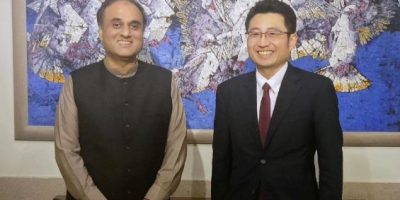SC seeks record of NA proceedings on no-confidence motion

ISLAMABAD: The Supreme Court on Tuesday sought the record of National Assembly proceedings conducted on the no-confidence motion filed against interim Prime Minister Imran Khan.
The apex court issued the directives as it resumed its hearing on the legality of the ruling by NA Deputy Speaker Qasim Suri to dismiss the no-confidence resolution against PM Imran without voting.
A five-member bench headed by Chief Justice of Pakistan Umar Ata Bandial, and including Justice Ijazul Ahsan, Justice Mohammad Ali Mazhar, Justice Munib Akhtar and Justice Jamal Khan Mandokhail, is hearing the case.
Yesterday, the CJP had remarked that the court would issue a “reasonable order on the issue”, but the hearing was adjourned after Farooq H. Naek, the counsel of PPP and other opposition parties, presented his arguments.
At the outset of today’s hearing, PPP Senator Raza Rabbani noted how, according to media reports, the Election Commission of Pakistan (ECP) had said it was not possible to hold general elections within three months. However, the ECP has denied issuing any statement concerning elections.
He also said that the court had to examine the extent of the “immunity” of parliamentary proceedings. “Whatever has happened can only be termed as civilian martial law,” he said.
“The no-confidence motion can’t be dismissed without voting on it,” he said, citing Article 95 of the Constitution.
Rabbani also said that a deliberate attempt was made to construct a narrative against the no-trust move while a foreign conspiracy was also touted. He said that the NA session held on March 21 was adjourned after offering prayers for a deceased lawmaker, adding that this had not happened in the past.
The senator said that Fawad Chaudhry, speaking on a point of order during Sunday’s session, had talked about the letter and the foreign conspiracy even though it was not on the day’s agenda.
He also maintained that it was wrong of Suri to term opposition lawmakers as traitors without providing any evidence. A no-confidence motion was also submitted against Asad Qaiser which limits the power of the speaker, he said, adding that assemblies could not be dissolved during the no-confidence process.
He urged the court to dismiss the deputy speaker’s ruling and to restore the National Assembly, adding that the minutes of the National Security Committee and the ‘threat letter’ should also be presented.
After Rabbani, PML-N’s counsel Makhdoom Ali Khan presented his arguments. He began by stating that the no-confidence motion was submitted to the NA with the signatures of 152 lawmakers while 161 had voted in favour of tabling it. “After that, proceedings were adjourned till March 31.”
As per the rules, the counsel pointed out, a debate on the no-trust move was supposed to be conducted on March 31. “But a debate was not held,” he said, adding that voting was also not conducted on April 3.
He noted that according to the no-confidence motion, the prime minister had lost the confidence of the majority of the National Assembly. “Shehbaz Sharif had submitted the motion as per the rules of business,” he said, adding that the NA session was adjourned till April 3 without conducting any proceedings, he said.
The PML-N’s counsel also said that the deputy speaker did not give the opposition a chance to speak during the session held on April 3 and gave the floor to the former information minister.
At that, Justice Akhtar said that the process of the no-confidence motion was underlined in the rules of procedure, not the Constitution. However, Khan argued that rules were formed on the basis of the Constitution.
Continuing his argument, the PML-N lawyer said that the no-confidence motion can’t be dismissed by the speaker once it is tabled in the NA.
At one point, the CJP asked whether a debate was held on the no-confidence move, to which the PML-N lawyer replied that it was not.
Justice Bandial also asked whether a majority of lawmakers were present in Parliament when the no-confidence resolution against the prime minister was tabled, noting that it required the support of 20pc of the lawmakers.
He observed that constitutional provisions cannot be trampled through rules.
Justice Mandokhail added that the real question was whether the deputy speaker’s ruling was legal or illegal. “The real issue is to examine the constitutional status of the ruling,” he said.
He also questioned whether “illegal factors” in the no-confidence motion could be investigated, to which the PML-N lawyer replied that the apex court had the right to do so.
CJP wonders why opposition skipped parliamentary committee meeting
During Monday’s hearing, Justice Bandial had observed that it seemed that the question of illegality in the filing of the no-trust motion could have been addressed earlier, but once the leave of the house was granted, then the stage of raising objections had passed.
Justice Akhtar, meanwhile, had questioned the deputy speaker’s constitutional authority to pass such a ruling. “I don’t think the deputy speaker had the authority to pass such a ruling,” he had said, adding that only the speaker could do so.
The CJP had also wondered why opposition members failed to attend the meeting of the parliamentary committee on national security, during which contents of the ‘threat letter’ were shared with parliamentarians.
“This needs to be answered by all political parties,” he had said, terming the parliamentary meeting important.
Earlier, Naek had requested the CJP that, in view of the grave emergency and public importance, the court should consider constituting a full court consisting of all judges, as had been done in the past.
At this, the CJP had said that if the counsel had no confidence in any member of the bench, the court would rise, adding that the full court was a luxury and during the last two years “we have suffered since 10,000 cases accumulated because of 63 hearings in the Justice Qazi Faez Isa case by a 10-judge bench”.
Related News

Japan, Pakistan emphasize mutual benefits in key sectors
ISLAMABAD, APR 19 /DNA/ – Director General (Asian Affairs Department) of the Japanese Ministry ofRead More

PM commends UAE’s leadership response to recent rains in telephone call with President Mohamed bin Zayed
ISLAMABAD, APR 19 /DNA/ – Prime Minister of Pakistan Muhammad Shehbaz Sharif held a telephoneRead More


Comments are Closed